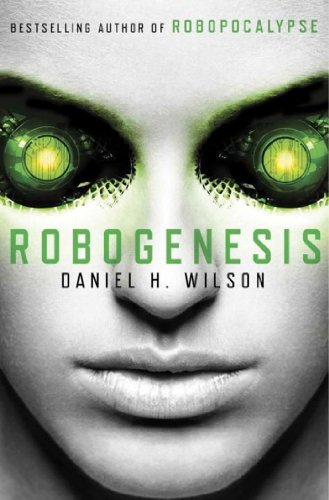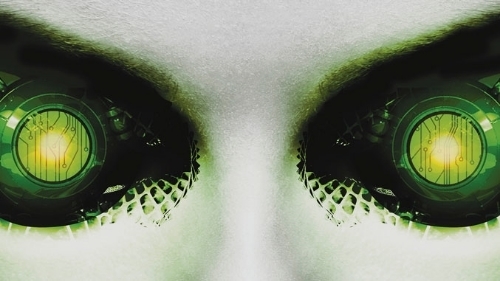Firstly before I begin I would like to thank Daniel H. Wilson for providing me with an ARC copy. As a big fan of Robopocalypse I felt honoured to be given such a privilege and this review is the least I can do to show my gratitude.
Robogenesis is the sequel to the highly praised Robopocalypse. For those who haven't read Robopocalypse in a while I would suggest that you re-read it before Robogenesis. It's not compulsory and you will still understand Robogenesis, but I personally benefited from reading Robopocalypse again first as it was fresh in my memory.
If you were a huge huge fan of Robopocalypse like me, then you're in for a real treat. Why you ask? Because personally, I feel like Robogenesis is even better than its prequel. I had high expectations already, but said expectations were completely blown out of the water with this sequel.
The story is split into three parts. Lark Iron Cloud, Mathilda Perez, and Cormac Wallace. I was really pleased about this as they were my favourite characters in Robopocalypse. If however, like me you were also a big fan of Nine Oh Two and Takeo Nomura don't worry, they are still a big part of Robogenesis and you will get to see their perspective/narrative as well, so don't be under the impression that they are left out of the main plot.
The thing that enticed me with not only Robogenesis but also Robopocalypse, was the setting. Daniel H. Wilson is a natural at setting the scene and making it realistic for his readers. I genuinely felt encapsulated in this story, and I also felt like I was part of the Gray Horse Army. To create that impression in a story is a very difficult thing indeed, Wilson does this perfectly, almost at ease.
Another interesting thing about the setting is that it never stays the same for extended periods of time. This is a great thing because if you're like me and get bored of setting rather easily, this will not be a problem for you. The setting ranges from basements and offices to wide open woods and so much in-between.
What I liked about Robogenesis more so than Robopocalypse was that everything was tied together quickly and the story unfolded before my eyes in a rather genius way. We follow the stories of quite a few rather intriguing characters, and it's easy to see where said characters tie in with the rest of the story, for better or for worse.
Another clever thing that Daniel does is his skill at balancing characters. Personally I usually go for a book with fewer characters, it's less confusing and I can relate to them better. This however revolves around a vast array of characters and I wouldn't have it any other way. There wasn't a point in this book when I said "oh great(insert name here) is narrating this part..how boring." In fact each and every time I was glad that each character was playing their part and tying things up and I could imagine myself in their position with ease. I was not at any point confused about who was doing what. It was easy to remember the roles each person was playing in the story even if there was a large gap between their parts.
Had this book been narrated from one perspective, it would not be the same book, and I am grateful that Wilson created such loveable characters that we can almost relate to in some ways. My favourites being Lark Iron Cloud and Nine Oh Two. This I didn't expect, because Mathilda has always been a favourite of mine in Robopocalypse, but the character building of Lark and Nine just got to me and I couldn't help but love them for their unique quirks that make them, them.
I could talk about this book all day and all night, with words still to spare. There was so much going on, and so much to talk about. It's one of those books that you can discuss with your friends for months on end.
This is the type of book that you can easily say "something happens in every single chapter." It truly does. I tested it myself, read a chapter, asked myself what had happened, and listed at least 5 things each time. I then proceeded to do the same for each and every chapter to act as a recap for what at happened and it truly made me realize how much is condensed into this story to make it an action-packed plot.
I also didn't think I could get emotional at such a book but at some points I was actually tearing up! Not only at the raw emotion felt by these characters but the experiences they went through. I shan't list these things I got teary over, as this review is purposively spoiler free.
Admittedly, when I was younger, robots never used to be my thing, I was more of a person interested in the past than I was the future. However, because of this book (and Robopocalypse), my view points have changed dramatically, and because of Daniel H. Wilson I shall be reading more books like this, so thank you Daniel.
I don't even need to consider what rating this book deserves. It's an obvious five. It's been an incredible journey so far and I feel very lucky to be a part of it. To say that this is one of the greatest books I have ever read would be an understatement and I cannot put into words how truly great this book is. It is a diamond amongst broken pieces of glass.
I am biting my nails in anticipation for the next chapter in an absolute masterpiece of a series. I shall be reading this again, and again for the foreseeable future and sharing it with as many people as I possibly can because it truly is worth sharing.
Bottom line, read it. You shan't regret it.




